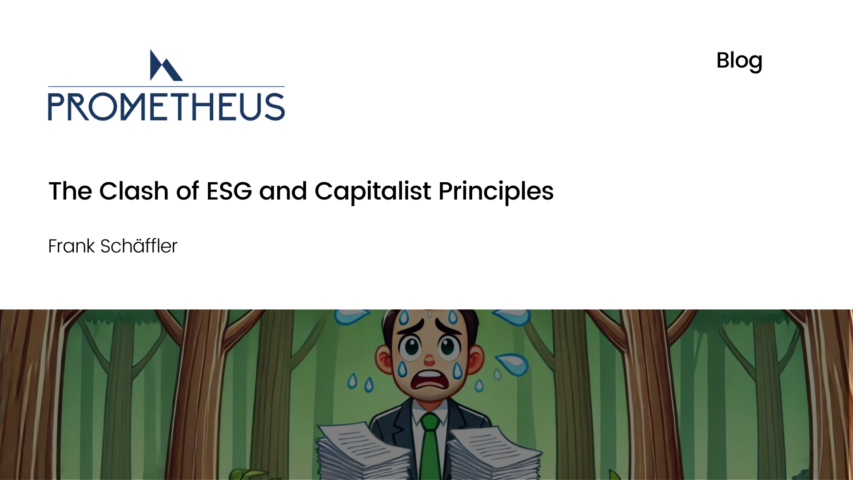The Clash of ESG and Capitalist Principles

The Clash of ESG and Capitalist Principles
Frank Schäffler // 23 July 2024
Capitalism, the market economy, and freedom are always on the defence, especially when politicians influence economic processes, guide behaviour, and regulate prices. In times like these, localisation is important.
The economic order of freedom is capitalism and its competitive order is the market economy. In capitalism, private property is the constituent force. This distinguishes it from socialism. Without the possibility of forming private property, there can be no freedom of the individual. This is because the realisation of individual plans and life goals requires the ability to dispose of things. This is why capitalism is also the natural economic order that exists without state coercion.
The market economy is the decentralised planning and control of economic processes that are coordinated via markets with the help of the price mechanism. The market economy, therefore, does not determine the ownership structure. Capitalism answers this question.
Theoretically, it is possible to imagine a market economy without private ownership. Before the wave of liberalisation in the postal, telecommunications, and energy sectors in the 1980s and 90s, this was the case in the old Federal Republic of Germany. Companies in these sectors belonged to the state. As we all know, this did not work particularly well. Services were expensive and poor quality, and the companies were inefficient. Somehow, energy policy today gives the impression that we are heading back to the days before the 1980s and 90s.
Freedom of contract is also constitutive of the capitalist economic order. Only those who can choose their customers and suppliers without state coercion are free and can develop themselves and their economic activities freely. Capitalism recognises two sides of the same coin – success and failure. Success is maximised in capitalism. The American dream – from dishwasher to millionaire – is a real opportunity under capitalism. The other side of the coin is failure. In a capitalist economic system, failure goes hand in hand with liability and thus with the assumption of responsibility. The limitation of liability as we know it in corporations is actually contrary to the system. The ideal is the merchant, the craftsman, and the freelancer, who have unlimited personal liability. Those who can limit their liability are more reckless with risks and ultimately involve others – suppliers, customers, or the state – in these wrong decisions. This is unfair because it does not pay justice to who causes the damage.
The rule of law sanctions the abuse of capitalism. It ensures the ability to function through courts, criminal prosecution, and more.
Socialism, on the other hand, is an artificial invention in all its forms. Socialism puts equality before freedom. The consequence of this is that under socialism, private property is destroyed by the system. Liability and the price system are suspended, with all the consequences that this entails.
Responsibility cannot be assigned; the misbehaviour of individuals must be borne by the collective. Whether the misconduct was wilful or not is ultimately irrelevant to the failure.
The lack of a price system means that it cannot be known when, where, and of what quantity and quality products and services must be provided and produced. Ultimately, every socialist system gropes around in the fog. When we talk about socialism here, we are not just referring to the state socialism of the GDR or the Soviet Union. The fact that this ideology failed is reported in most history books. However, the ‘softer’ forms of state control and centralised planning are particularly dangerous today. Ludwig von Mises described this form as catheter socialism. Ultimately, it is a centralised influence on the planning and control of economic processes. It is an erosion of property through state intervention. It is not the individual who decides the weal and woe of his or her company. Instead, it is defined directly and indirectly through prohibitions and requirements decided by the government and parliament.
The EU’s sustainability regime (ESG criteria, taxonomy) is one such softer form of state control. It not only forces companies to generate extensive documentation and thus bureaucracy, but it also influences stock and credit markets as well as public procurement and standardisation. Entrepreneurs and companies participating in economic life cannot escape these criteria. They can only operate to a limited extent, are burdened with bureaucratic costs, and are governed by regulatory law. What is ‘sustainable’ is then defined by governments and parliaments, not by entrepreneurs and their customers, i.e., consumers. Getting to the heart of the matter, economist Ludwig von Mises has described this bureaucratisation as a ‘special kind of nationalisation’.
Neither governments nor parliaments know what citizens as customers and consumers define as ‘sustainable’. For some, the use of nuclear power is sustainable, for others, it is not. Every citizen probably has different views on the subject of sustainability. Entrepreneurs and companies as suppliers probably also have different views on the subject. If it is of interest to a larger group of customers that products and services are produced or offered according to certain criteria, the capitalist economic system will have a response to it.
In a capitalist economic system, the state, the executive, and the parliament do not intervene directly in economic processes, but decide on abstract, general rules that are the same for everyone. More restraint on the part of the state when it comes to new laws and regulations would, therefore, be a start.
This blog was originally published on Prometheus' blog in German.
EPICENTER publications and contributions from our member think tanks are designed to promote the discussion of economic issues and the role of markets in solving economic and social problems. As with all EPICENTER publications, the views expressed here are those of the author and not EPICENTER or its member think tanks (which have no corporate view).



